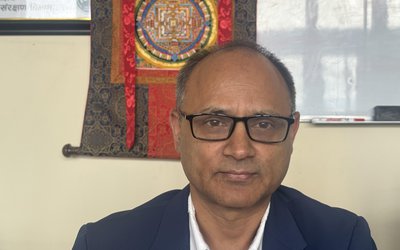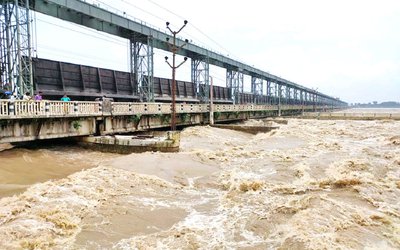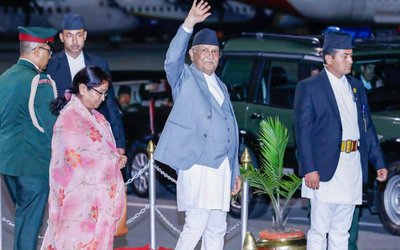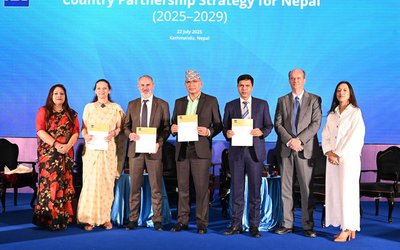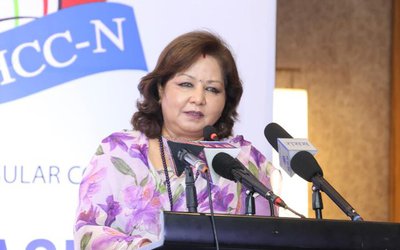
Sujit Acharya is the CEO of IDS Energy – Nepal’s only integrated hydropower company in Joint Venture with one of the world’s largest hydropower development and consulting companies and the only hydropower company in Nepal to have developed a hydropower project in India. He recently served as the youngest board member of the Nepal Electricity Authority and is a student of special studies in Management of Harvard University, USA. He graduated from Bentley College, USA with a degree in Finance. He can be contacted at sujit@idsenergy.com
What may be the role of private sector in hydropower in Nepal?
The role of the private sector in hydropower sector is immense – especially when we talk in the context of Nepal because we have 200,000 MW of hydro potential. Hydropower in Nepal cannot be built optimally and effectively without the private sector. Even today, in this absolutely horrible economic climate with no friendly policies and incentives to the private sector, it has generated more than 40% of the total hydroelectricity of Nepal. Additionally, most of the major hydropower projects in Nepal are now being constructed by the private sector – with the exception of the Upper Tamakoshi project. The private sector does things for a profit – and to make profit one must be cost effective. Therefore, the hydropower plants it builds are very cost effective – which means the cost of generating electricity from its hydro plants will be lower and this lower cost means the consumer gets to enjoy electricity for a lower price. The reason electricity is costly in Nepal is solely because of the Government’s complete incapability to manage its costs and make terrible decisions like buying energy from private sector projects like Khimti and Bhotekoshi at an unreasonable price. Secondly, while the private sector will create lots of jobs, it is the high quality of hydropower professionals it will churn out that is vital for the proper growth of hydropower sector. Smart, thorough and intelligent decision makers will arise from the private sector versus from the Government where it seems politicians and bureaucrats are competing with each other for being more corrupt than the other.
What role the government has then?
This does not mean that the Government has no role in hydropower – it has a very important role too. For example, the private sector will never build very costly hydropower plants unless there are incentives. In such circumstances, it is the responsibility of the Government to build such plants because the citizens in that area also need electricity – even if it costs more to generate that electricity. There is a school of thought that thinks the role of the private sector compared to the government is not important – and another school of thought thinking exactly the opposite. Both mindset groups are extremely mistaken. Both have very important, distinct and non-competing roles.
Do you think that the Nepalese private sector can construct the national demand? What incentives should they get from the government side during this upcoming supplementary budget?
Only the private sector can construct the national demand and exceed it. This is the fact. This is the 100th year of birth of hydropower in Nepal – and we are facing load shedding because of the government’s bankruptcy in vision and incapability in rapid implementation. The private sector stepped in approximately 20 years ago and has almost equaled what the government has done in the last 100 years. Imagine if proper incentives had been introduced – I would not even have to answer this question. The upcoming supplementary budget can only provide short term relief – it is not the proper tool to encourage hydropower development in Nepal sustainably. This must be done by correcting the absolutely horrendous version of a draft Electricity Act that is currently tabled in Parliament. If the current version passes, the hydropower sector of Nepal will be doomed. However, as short term relief, the new Finance Minister needs to immediately waive off both VAT and Customs Duties or offer complete reimbursement of such taxes and duties. I know the finance ministry currently houses high level decision makers who think this will reduce the government’s budgeted revenue from tax collections. Such people are the ones bankrupt in vision and holding this nation hostage to development. If this school of thought prevails, very soon such decision makers will be writing the upcoming budget speeches under candle light. These people need to know that the globally accepted norm is that hydropower is taxed after it is constructed and pays off its loans by governments – and not before it takes off. Maybe they never read the story of the man who killed his goose that laid golden eggs. These duty and tax waivers can only happen if the new Finance Minister has the guts to overrule these bankrupt decision makers and make the right call.
As an entrepreneur, what are the major problems faced by the private sector in hydropower in Nepal?
The private sector is fed up dealing with people in the government and lawmakers that are bankrupt in vision, ideas and knowledge. Their ignorance has held hostage the development of hydropower in Nepal. At this juncture, the most important problem of the private sector is amendment of the draft Electricity Act to ensure it is also private sector friendly. This Electricity Act is the constitution for hydropower in Nepal – and if the lawmakers pass the wrong version, hydropower development is bound to be doomed once again. All lawmakers are requested to read the latest copy of the Electricity Act in India and in Bhutan (who will compete with Nepal to get private investment) and then ratify an Electricity Act that is at least at par with these countries. If they cannot get their hands on these Acts, I will personally make it available. Secondly, we request the Government to get its collapsing house in order. As the NEA is bankrupt and about to collapse, it is most urgent a new separate Transmission Line Authority is set up immediately to ensure transmission lines are built. If this is not done, and the NEA collapses, who will build transmission lines in Nepal? – Without which hydropower projects cannot be developed which in turn means more load shedding for all of us.
Nepal is reeling under power crisis and it is learnt that this will continue for some time. What are the major reasons for this?
The main reason for power crisis is because there is Vision Crisis of how to properly develop the power sector of Nepal within the Government. How else can we explain a country like Nepal having approximate 200,000 MW of hydroelectric potential developing less than 0.5% of this potential in the last 100 years when the first hydropower station began operation in Pharping? How else can we explain the Government continually leaving the entire development of the hydropower sector at the mercy of a bankrupt monopoly utility i.e. Nepal Electricity Authority which has never built even one power project on time, within the stipulated cost or generated the estimated energy it is supposed it generate? And how else are we to explain a Government that continues to look helplessly at its students are not being able to study properly because of no electricity for their SLC exams thereby scoring poorly or even failing and destroying their careers or a patient dying in a hospital which cannot administer treatment through medical equipment because of load shedding – are these not tantamount to crimes committed by the Government on its citizens?
Why is hydropower so important for Nepal?
Electricity is the backbone of any nation’s economy. You cannot do anything without electricity in today’s world. You cannot build roads without providing electricity – neither can you impart proper education to your citizens without having electricity. None of your tourism plans will become successful without electricity; neither will you be able to provide health services to sick citizens without electricity. Your industries will not run, you cannot watch TV’s, neither can you pump water into your farmlands without electricity. For every 1% economic growth to happen, it must be supported by 1.5% energy growth. The importance of having electricity today is above politics, which is why you see even adversarial nations like India and China joining hands to secure various forms of energy from even the most troubled regions of the world.
How important hydropower is?
Because hydropower so far is the only form of commercially feasible electricity in Nepal, it cannot just be labeled as so important for Nepal but rather as the single most important sector for Nepal. Besides providing electricity to power our entire nation and its development, the mass abundance of hydropower here has the ability to completely uproot poverty from the life of each and every Nepali citizen – because we can sell this abundance of electricity for billions of dollars on a yearly basis to the two largest economies desperately in need of this commodity i.e. India and China. But so far this has not happened because of the bankruptcy of vision that exists in terms of developing our hydropower within our government, the ability of politicians to continually fool us that we need political resolution before economic development and the inability of us Nepali’s to realize that we are being completely fooled by them.
How can you say that Nepali citizens are being fooled by politicians?
I want to first ask every Nepali citizen reading this interview whether they want to continue to remain poor for the rest of their lives? Secondly, I want to ask them if they want to continue to see this poverty transferred in the lives of their children? If the answers to both these questions are NO, then they should understand one thing clearly – we cannot wait for our lives to be held hostage to politics. Arthik Kranti has to happen now and not later on. Have you not seen for years on your TV screens news about a country like Israel facing tremendous political turmoil for years continually progressing economically – so why do we have to wait? But Nepalese politicians continually fool us common Nepali’s that economic development can only happen after political resolution – and we allow them to fool us. Please tell me if a man in his late 70’s is Syangja with no electricity can wait for politicians to resolve their disputes in order for electricity to reach his house – he might die waiting for their disputes to end. An industry in Biratnagar employing thousands of workers cannot wait for politicians saying “Arthik Kranti” will happen after the nation sees a political change – because the livelihoods of those thousands of workers and their children depend on that factory running properly NOW and not later on after political resolution.
Why electricity is matter?
Without electricity reaching that factory now, it will not run properly and those workers will be laid off. The mind of the entire nation has been held hostage with politics. And this is the main reason why we are poor – it is because we continue to allow politics to seep into our lives on a daily basis. That is why we suffer from no electricity, no water, no jobs, no good roads, and no self esteem. The biggest problem facing Nepal is poverty – this is the root of all major problems and uprooting this will be the solution to many problems. Therefore, I appeal to all Nepali’s to ask themselves whether the flag they are holding in their hands shouting for change is the right one? The flag I want to hold in my hand is of economic change – and this flag has no political color. Holding this flag ensures my children will not have to use candles to study for their SLC exams, that we will have proper roads built through which our farmers can transport their products throughout the country and internationally to sell it at the best prices, that we do not have to ever act as beggars in front of foreign countries for loans and grants at their terms and conditions – because the spirit of a Nepali is much more than this…it is about being independent, self sufficient and wanting to always win.
So if this is the case, how can we as a nation develop our hydropower rapidly and successfully to transform our lives out of poverty?
Generally speaking we need to bring about 3 types of transformation immediately i.e.
- Understand that hydropower is the backbone of our economy and main ticket item out of poverty
- Understand that our government and political parties are completely bankrupt in their vision and abilities to develop hydropower
- Apply pressure to bring about complete change in developing these resources systematically and inclusively but without obstructing any activity that consists of development of hydropower (which should be labeled as a severely punishable crime)
Technically speaking, the following 5 things need to be addressed immediately:
- The upcoming Electricity Act tabled in the Parliament needs to contain key changes that ensures hydropower will develop rapidly and inclusively;
- An independent Transmission Line Authority needs to be set up immediately;
- The licensing policy at the Department of Electricity Development needs to change to attract upfront premiums from the highest bidder to prevent brokers (key obstacles to hydropower development) from hijacking the nations single most important economic resource;
- The energy planning data of Nepal needs to be updated to address today’s market situation;
- Nepal Electricity Authority needs complete transformation so that it can run as a profit-making entity.
Can you please explain what needs to change in the proposed Electricity Act?
The drafters of the proposed Electricity Act and parliamentarians need to understand that if it is implemented in its current form it will fail just like its predecessor because it is almost a carbon copy of that act albeit a few changes. This proposed Act if passed in its present form in parliament will lead Nepal again into darkness just as the past 100 years have done so. Therefore, lawmakers need to do a lot of work in ensuring hydropower is not doomed again. The major changes to be inculcated are: (i) project licenses needs to be given for at least 40 years from C.O.D on a BOOT basis (ii) All taxes and duties exempt for 10 years after C.O.D (iii) Capacity Royalty should be calculated from the day the project starts generating electricity (iv) A minimum 5 year non-bail able jail term handed out swiftly to anyone obstructing the construction and operation of hydropower and transmission line projects and (v) Transmission lines to be built solely by a new government owned Transmission Line Authority of Nepal and not the NEA. These minimum changes are required because Nepal’s competitors like India and Bhutan offer these and better incentives to all parties interested in developing hydropower in their countries. If we do not offer these minimums why should any investor (foreign or domestic) want to develop a hydropower project in Nepal when they can simply do it in India or Bhutan? Our proposed Act is not even at par with these competitor countries. This is what I meant by bankruptcy in vision of our policy makers in drafting this proposed Electricity Act – they have not even read our competitors current electricity acts.
Why do you think we need an independent Transmission Line Authority?
What one needs to understand is that a transmission line is like a road – on which electricity travels. Therefore, just like we cannot drive cars if there are no roads we cannot use the generated electricity without developing transmission lines. An independent Transmission Line Authority needs to be immediately set up because this is the major implementation hurdle to hydropower development. There are not enough transmission lines up in the country to evacuate power from various hydropower projects that can be developed right now – which means that while we can bring more electricity online faster we are not being able to do it because of transmission line unavailability. We don’t even have a transmission line available to import electricity right now to immediately solve our load shedding problems The Nepal Electricity Authority had proven it is unable to developing transmission lines rapidly because it also other areas of focus too i.e. to develop projects like Tamakoshi and distribute generated electricity from such projects to various retail consumers. That is why we have load shedding today. Therefore, leaving the development of transmission lines in the hands of a utility that has other areas to focus on is simply continuing to put the brakes on the pedal of hydropower development.
Why do we need independent Transmission Line Authority?
If an independent Transmission Line Authority is set up it will only have one focus area i.e. to develop transmission lines throughout the country. This will ensure the rapid development of transmission lines – which means that developers of hydropower can bring their shelved projects online faster. Even the NEA could operate more efficiently as it would have a less diluted focus. Of course, the organizational set up of the Transmission Line Authority needs to be very different from the setup of the NEA to ensure it will not be another debacle like the NEA. While the ownership of the Transmission Line Authority should be 100% government owned, the Board of Directors should consist of people who understand how to run a Transmission Authority profitably, each member of the board should have an equal voting right on decisions, the chairman of the board should be appointed by the board members on basis of the vote and the C.E.O of the Authority should be selected through international competitive bidding under a strict terms of reference for a specific term by the board. Most importantly, no politician or minister should be a part of this authority and all political appointments should be banned.
Finally, can you expand a little on the changes you propose in the licensing policy, the energy planning date and the NEA?
I have spoken at lengths about how the current licensing policy at DOED is causing billions of dollars of loss to our nation. My point was recently proven right when the DOED finally decided to tender 8 projects and allot them to technically qualified bidders who offered the highest money for these licenses to the DOED. One successful bidder bid 26 crores for a 40 MW project and the minimum price a successful bidder paid was 20 lacs per MW. The DOED should take this minimum price of 20 lacs per MW it received and tell all the applicants who have applied for licenses that this is the new price they need to pay for the projects they have applied. This will fetch the DOED more than 8000 crores (more than the entire budgeted income of the country) and also get Nepal rid of the hydropower license brokers who have placed their bets on hijacking these licenses and then reselling it to the real developers. The recent tender by the DOED has proven 8000 crores of revenues through licensing can be made – and if they still do not use this example to modify the policy, I hope the monitoring bodies of Nepal like the CIAA can direct them to make such changes immediately.
How do you see energy planning data?
Regarding the energy planning data, who says we have 83,000 MW? Please show me one document that states this. Who says we have 6000-8000 rivers in our country…please provide me one document that proves this. These data are all either incorrect or from another era decades ago. We need to update our data to current levels to understand exactly how much hydropower resources we have (in my opinion 200000 MW but a general survey of Nepal’s hydropower resources need to be conducted) so that we can devise strategies to develop these resources optimally (updated basin planning and allotment of licenses based on these updated basin plans, etc) and market them strategically to investors.
What do you want to say about NEA?
Finally, as I have served as a board member of NEA recently, I understand that two kinds of changes are required to transform this entity from a bankrupt, corrupt and incompetent one into a profitable, transparent and efficient one. Externally, the Govt. of Nepal needs to stop interfering with the NEA so that it can make its independent decisions thereby actually running as an autonomous institution that it was supposed to be. Cabinet decisions like waiving-off demand charges that had to be implemented by the NEA caused it a 1 billion rupee loss instantly. The Finance Ministry acting like a commercial bank by taking soft loans at a lower interest rate and lending it back to NEA at a higher interest rate needs to also stop. Internally, the Board of Directors of NEA should not be political appointees but rather selected from different sectors based on strict evaluation, each board member should have equal voting right on the decision, the chairman of the board should be appointed by a majority vote of the board members and the managing director selected via international competitive bidding. And most importantly, the Energy minister or any politician should not be a member of the board or its chairman. It has to be left in the hands of techno-commercial people to ensure it runs as a profit making entity.
- EU’S ERASMUS MUNDUS: Scholarship For Quality Education
- Aug 05, 2025
- ADB: Partnership For Growth
- Aug 04, 2025
- HCC-N: Economic Ambassador
- Aug 03, 2025
- MONETARY POLICY: Disappointing Outcome
- Jul 17, 2025
- MELAMCHI WATER SUPPLY: No Interruption During Monsoon
- Jun 25, 2025
